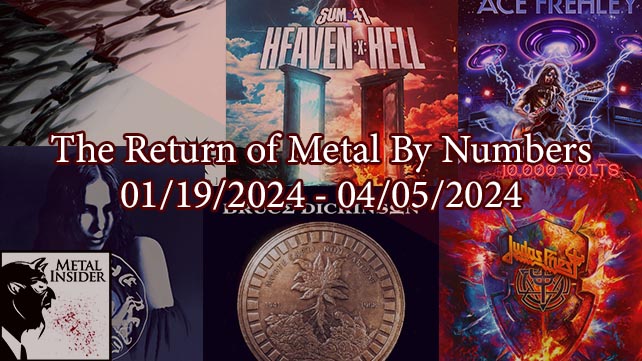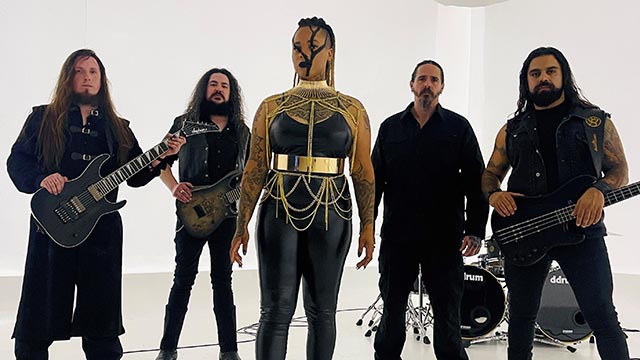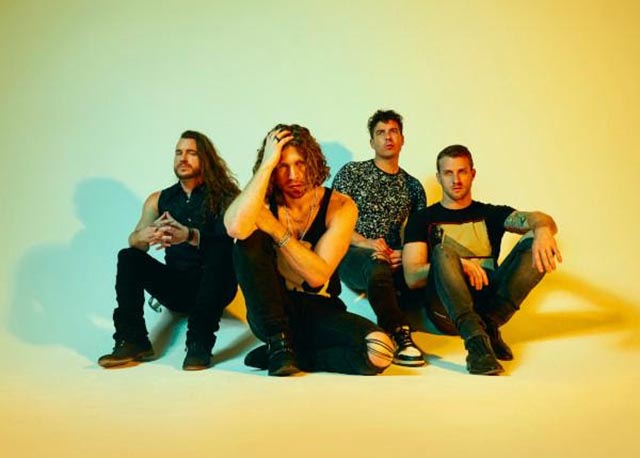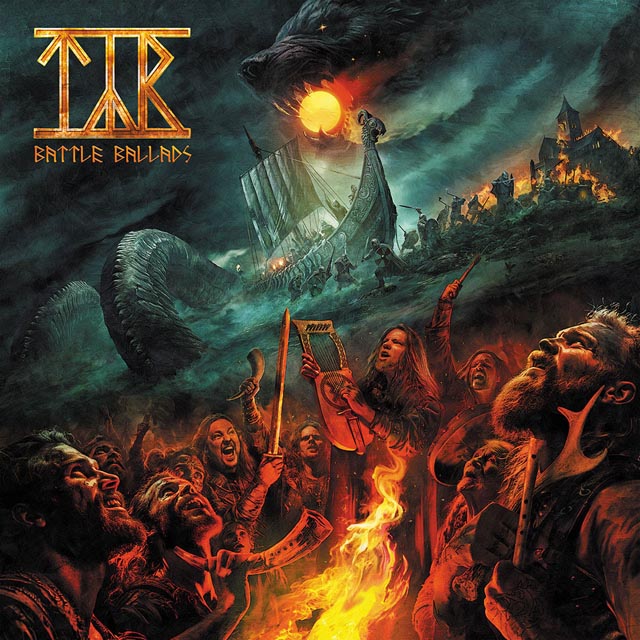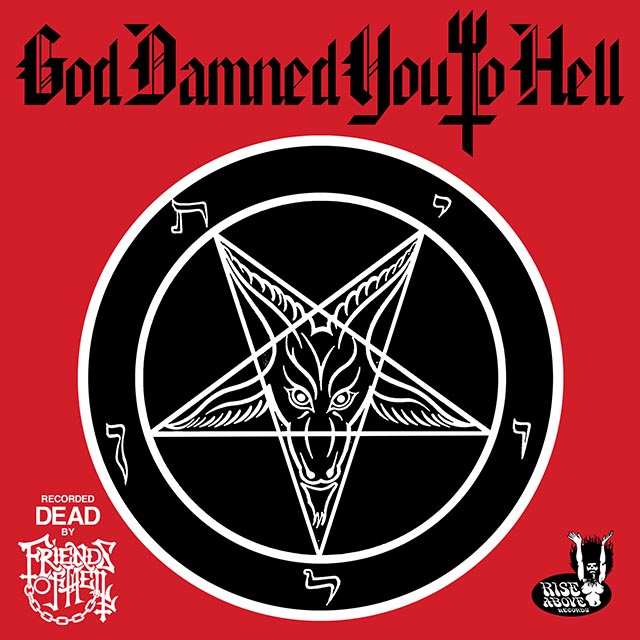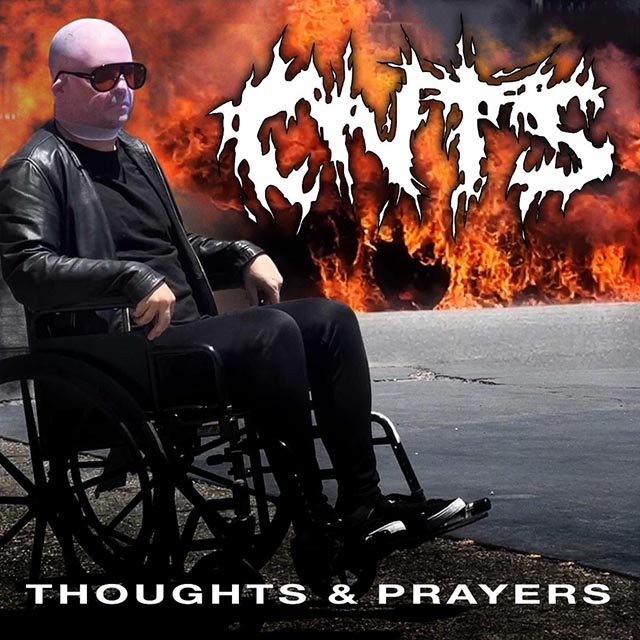 The melodic death metal movement of Gothenburg, Sweden is well-known to virtually all metalheads. When that phrase is ever uttered, one of the first bands that generally pops into people’s heads is In Flames. The now legendary band has been cited as a source of influence by countless other groups. However, In Flames is also known by many as a band that has experienced a change in the sound of their music over the years. In any case such as this, a shift in musical direction or approach can be met with either praise or displeasure, depending on perspective. Regardless, In Flames continues to have success from fans across the world, including with their latest release and eleventh overall album, 2014’s Siren Charms. While on the third leg of their North American tour supporting this album, I had the opportunity to pick the brain of vocalist Anders Fridén, where we discussed the latest In Flames release, their musical history, and his love of beer. I also chatted with bassist Peter Iwers afterwards, who was lounging with his band and road mates outside in the parking lot of Pop’s in Sauget, IL (just across the Mississippi River from St. Louis).
The melodic death metal movement of Gothenburg, Sweden is well-known to virtually all metalheads. When that phrase is ever uttered, one of the first bands that generally pops into people’s heads is In Flames. The now legendary band has been cited as a source of influence by countless other groups. However, In Flames is also known by many as a band that has experienced a change in the sound of their music over the years. In any case such as this, a shift in musical direction or approach can be met with either praise or displeasure, depending on perspective. Regardless, In Flames continues to have success from fans across the world, including with their latest release and eleventh overall album, 2014’s Siren Charms. While on the third leg of their North American tour supporting this album, I had the opportunity to pick the brain of vocalist Anders Fridén, where we discussed the latest In Flames release, their musical history, and his love of beer. I also chatted with bassist Peter Iwers afterwards, who was lounging with his band and road mates outside in the parking lot of Pop’s in Sauget, IL (just across the Mississippi River from St. Louis).
To start, I want to talk about this current tour. This is at least the second time that All That Remains has been booked as direct support to In Flames on a North American run. Although, I remember that All That Remains had to drop off the 2008 run (which also included Gojira and 36 Crazyfists) due to issues with vocalist Phil Labonte’s voice. Have you toured with All That Remains other than these two tours as well? Either in the U.S. or other countries?
I believe that previous one that they were on for a very short time, that was the first one. [There are] So many tours… it’s hard, to be honest [laughs]. But [they’re] good people.
How has this tour package been with Wovenwar on the first leg and Periphery on the second (although they’re not playing tonight) in comparison to other tours? I guess the first leg was co-headlining with Opeth.
This is the third time we’re in the U.S. for this album. Co-headlining with Opeth, then All That Remains and Wovenwar tour… and Red Fang on the Opeth tour, also.
So was the Opeth tour the same vibe, or same set list? Or was it different at all, doing a co-headlining tour with Opeth and then now headlining with All That Remains as direct support? Or is All That Remains kind of a co-headliner on these two legs? The most previous one and this current one.
No, as far as I know, we’re the headliners. But it’s something [that] I don’t care so much about. [Laughs] We care about the time that we have on stage for the audience. That’s what matters the most; we have to have the same attitude, whether we play first, second, or last. Then, obviously, it’s a different setup, stage-wise, with the lights and what you can or can’t do. On the Opeth [tour], it was like… equal, really. They had their stuff and we had ours. But we didn’t put a restriction towards anything. But, those are things that are done by management, not the guys in the band [laughs]. We just go out there and play; managements and agents, they’re the ones setting the rules.
You’re supporting your latest and eleventh album, Siren Charms, which was released back in November. What was the writing and recording process like for this album as compared to your previous efforts? What was different, what was the same?
[The] Difference was that we went to Germany to record this one. We had been in our own studio [for] a couple of albums. But we sold that studio, so we had to go somewhere else [laughs]. A year prior to the recording of Siren Charms, I was in Berlin for a different matter. And I went up to Hansa Studio, because I’m a Hansa Studio fan. Depeche Mode… tons and tons of bands have been recorded there. David Bowie and Iggy Pop, those are ones; it’s a legendary studio. And I was just amazed by the whole vibe there. I called the guys and said, “I found the studio, this is the place,” and nobody said “No” [laughs]. And it’s not that far from Gothenburg, or Stockholm either; it’s just a one and a half hour flight, so it’s quite nice. We had a… we called it a “bag of riffs” that we brought to the studio, but not really songs. [It] Could be, like, part of a song, but not anything that was finished. So the first two weeks, me and Björn [Gelotte, lead guitar (1998–present); drums (1995–1998)] just totally, super-focused, just tried to put all the pieces together. And then we had another four weeks to record the whole thing. And it was extremely stressful, but that was totally intentional, something that we asked for. Because I think we needed that pressure to do this album. And I mean, me personally, I can’t work when I have lots of distractions around me, or family coming and going, and friends coming and going. I need to be totally absorbed by the whole recording process, and that really helped. But it was tough at times. So that is what is sort of different from some previous albums. And apart from that, it’s just trying to write some good melodies [laughs], that’s what we’ve tried since the early days. That’s what In Flames is about, that’s what we do.
I understand that you’ve been pushing the single “Paralyzed” for rock radio airplay here in the United States. How has that been going for you? Is that something different that you’ve never tried before? Or is it something you have tried before, and if so are the results any different?
I don’t know [laughs], I don’t really pay attention. It’s, again, vanishment. It’s seemed to go all right, people recognize it when we play it, so I guess somebody’s doing something right. But we’ve never really been a radio band, ever. We don’t think about those terms when we write the music. So, I guess it’s sort of a first for us, radio. But there have been a few songs here and there that have had air time.
I seem to have noticed that In Flames has been getting booked on some big, local, destination festivals, like Carolina Rebellion and Rock on the Range. Is that new for you guys too, or have you been doing that, at least in the States, for a while?
I mean, we’ve done the Ozzfest and the Mayhem, Sounds of the Underground.
The touring festivals.
Yeah, yeah. But now, we’ve done a couple here and there, we’ve done Rock on the Range before. But now, for us, this cycle was perfect to be on those tours. We were going back here anyway, and to incorporate that in the touring cycle is good. For us, it’s… I mean, I want a lot of people to listen to my music – I’m not forcing people to listen to my music [lauhgs] – but if I get a chance to play in front of crowds that have never heard us before, that’s great. Because I think we have great material. And if I found out about In Flames today and I like what I’m hearing, then I would be like, “Wow! They’ve got another eleven albums, or ten albums that I can dig into.” That would be awesome. I would like to find a band like that on my own, you know?
Anyone who has listened to In Flames has noticed a shift in your music and writing style in to a more melodic, alternative metal sound since the release of 2002’s Reroute To Remain. And with the internet, fans’ voices can be heard anywhere and everywhere, all across the spectrum about how people feel about something. In your personal experience, what has fan response been like for you in regards to your music? Does it vary depending on the market or geographic location? Or is this something else that marketing deals with, and not the band directly?
…Um, that was a long question [laughs].
[Laughs] Yeah, I guess that was more like three questions. I can break it up…
[Laughs] No… I mean, the internet is a global thing. So it’s hard to say that it’s certain markets, you know. And I don’t have my own Facebook [page], so I don’t really pay attention to what’s going on on Facebook. And, you hear shit- or, “things,” I would say [laughs] – I don’t mean shit, I mean things – everywhere; people love or people hate you, and that’s how it is. There’s nothing I can do about it, I [don’t] want to do anything about it, and it doesn’t affect me at all. Of course, I would get happy when people say, “You’re good.” But if somebody says, “You’re shit,” then it’s not like I’m going to go home and cry, you know what I mean? “Oh, I have to change the way I approach my music.” I don’t know if that answers your questions, but… We hear things, of course. But what can you do? It’s part of the game, and stuff. That’s how it is these days; the internet has been good, the internet has been bad, it’s easy to voice your opinion, and if you want to do that, then whatever.
You can’t please everybody all the time.
Yeah, of course! I mean, it’s like, if you don’t like it… I never really understood that part; why people get so angry [about it]. I know metal fans in general are very emotional, and it’s great! You know? When they are really fans, they are die-hard fans, it’s amazing. But at the same time, people can get super, super angry, and start saying shit about your family, or whatever. You know, that doesn’t really, for me, have anything to do with what I do… But if that’s the case, I can’t control it. And if someone doesn’t like me, I can’t go home to that person and be like, “YOU! SHOULD! LIKE! ME! BECAUSE! I! BLAH! BLAH! BLAH!…” That’s not how it works, it’s out of my hands.
So it seems pretty safe to say that it’s important for you to write what you want to write, regardless of outside perspective.
Well of course, who writes from other people’s perspectives?
Some would play the “sellout” card, if they feel an artist is writing to cater to an outside perspective.
Well, what is [a] “sellout?” It’s just a term. I mean, I am here every night playing MY music. If I wrote it or sold it for someone else, I wouldn’t be [in a] band today. I mean, come on; that “sellout” is such an easy term to throw out there. We write what WE want to hear and if you like it, you like it. If you don’t, you don’t. It’s pretty fucking simple.
Makes sense. How does it feel to play or even listen to anything between Lunar Strain and Clayman? Is it at all weird, or does it all feel natural to you? Or does it feel natural, because in a way, all of your songs are your babies?
Oh sure! Every single album is there, and that’s why we’re here today. I mean, it’s all been small steps. None of the albums sound the same. It isn’t that super, super different. Like I said [before], what we try to do is write good melodies; that’s what we did back then, too. But we had a different palate… I mean, you grow older, you find new influences, you hear things, and then you know how to get your music across when it comes to production, and so on. I mean, early on we were [like], “Oh great, now we can record one million guitars on top of each other,” [but then], how do you re-create [that] live? It doesn’t work. I love those [earlier] albums; The Jester Race, that’s my first [In Flames] album and its super dear to me. When I think about those days, it’s fantastic. But at the same time, we were super-naïve, and I’m really happy that I am still here today doing what I do. I love all those albums. I think if you take one album out of the equation, the next album wouldn’t sound the same. So, they’re there for a reason.
So it was all a natural progression?
Yeah! Yeah for us, it is. I mean, I guess it’s hard from an outside perspective, because they [listeners] only hear you every third year, every second year, whenever you release albums. For us, within the band, we never force ourselves into doing anything. It’s me and Björn and Jesper [Strömblad, rhythm guitar, keyboard (1995–2010); drums (1993–1995)], when he was in the band and we wrote music [together], we were like, “How do we feel about this? Is it something that strikes right here [points to heart]? Yeah? OK, let’s keep it in. How does this riff [sound]?” “I don’t really feel it.” “OK, then we throw it out and get another one.” No one ever said, “We have to have THIS riff because it’s MINE,” or, “We have to have this riff, because its…”
…Because it’s “metal”?
Yeah! Yeah, I don’t really care about those terms; “metal,” “pop,” or “rock,” or whatever. We are coming from the metal world, and that’s my biggest passion. But I love a lot of a lot of music, and a good song is a good song. I don’t care what kind of tag you put on it.
I noticed the music you were listening to while you were grilling outside on the parking lot; old R&B and other things.
Yeah… it’s summer! [Laughs]
[Laughs] Yeah! I guess you have to listen to at least a LITTLE happy music!
[Laughs] Yeah, we were actually listening to something heavy, but we were [like], “Eh, it doesn’t really feel right.” So we did something else. But that could, maybe, change the scenario; tonight after the show in our bus, maybe we’ll listen to something super heavy [laughs], and we won’t listen to the R&B. Now we’ve found a playlist of, like, old ‘70s, ‘80s songs, mostly ‘70s songs. So that was quite nice. It’s not “new” R&B [laughs].
[Laughs] No, it’s definitely oldies! So, you mentioned one of your former members. In Flames has had its share of lineup changes over the years. Maybe not as many as other bands, but enough noticeable departures and replacements. Does that effect the band or individual members on a personal or creative level at all? If so, how?
I mean, to change a member today and get a brand new guy in the band, obviously could be a struggle for us, I guess. Because we have a certain way we are, and we’ve known each other for a long, long time. Niclas [Engelin, rhythm guitar (2011–present); lead guitar (1997–1998)] came in at a time when we had problems for a while, and he kind of brought some new energy. And, I mean, I love Jesper; the times that we had together were fantastic. He was a great songwriter [and] a really, really good guy, but he wasn’t really that happy in the end. And it started creating troubles within the machine, and we parted ways. And I think he’s happier where he is right now, and we’re happier where we are. So yeah, things change; people grow up, things happen to you, and so on.
As long as it’s all for the right reasons then; for the music, the band, and the people involved, so that everyone’s happy?
I mean, I couldn’t do this if I wasn’t happy. I can’t go off stage [miserable]; no, no, no. I can’t walk on stage feeling miserable. We all have families. We’re out here just because we fucking love what we’re doing. We love the metal music and what we do. You can’t have people around that are [unhappy], it just doesn’t feel the same. With that said, all of the member that we have [had], none got fired. It’s just like, you fall off [laughs], you know? It just happens.
Now I’d like to talk about something completely different than music: Beer.
Yeah!
I was chatting with your tour manager earlier when I showed up. We were counting all of the different beer bottles that people were drinking. I noticed our local microbrew, Schlafly, out there. The last time I saw you guys play in St. Louis with Lamb Of God in 2012, you had mentioned on stage that you went to one of their two breweries and restaurants. So, what are your thoughts on beer? And what are your thoughts on OUR beer? Whether Schlafly down at the lower end popularity and success, or Budweiser and Anheuser-Busch all the way at the top.
Well, I would put it the other way around; with Shlafly up here [gestures up] and Budweiser down here [gestures down]. [Laughs] No, I don’t have anything good to say about Budweiser. It’s poor taste or no taste at all, and it’s just there because they have tons of money and they can put that into [making] people believing that they are drinking real beer [laughs].
And you’re not afraid to say this at all? No possible endorsement deals you could be ruining?
Fuck, why should I be afraid to say that? [Laughs] It’s terrible. I mean, support your local craft brewery, people that do it with passion. I’ve met many, many brewers. Actually, a lot of people who work at breweries are metal people, which is amazing… They treat their product with the same passion that we do. They work with the malt and barley, the hops, all that stuff… the yeast. And, you know, that’s what we do with our riffs [laughs]. They want to create good beer, we want to create good songs; it goes hand-in-hand. Some of you guys drink Budweiser, which is not understandable; it’s their loss [laughs]. There’s so much good beer. In America, you have so many breweries. I have my own beer brand called FrQUuency, so I brew my own beer back home in Sweden; just released two beers before I left on this tour.
Can you tell me a little bit about those two brews?
One is [called] “Muddy Water,” and it’s a brown ale, a little bit more on the hoppy-side. And then I did a black IPA called “Crossroads.” Of course, I dig them [laughs] but they are great.
Will anyone here in the states be able to get those at any time?
Not right now, it’s [the brewery] is pretty small; [they’re] distributed in Sweden, you can get it in bars in Sweden. We have our store called Systembolaget, we have the monopoly on [alcohol], so you can get it there. But no, I can’t ship it yet. Not yet, maybe one day.
I’m sure there are plenty of In Flames fans that want to drink In Flames beer while listening to In Flames songs.
Yeah, Peter [Iwers, bass (1997–present)] and Björn’s bar, they usually have it. So we have In Flames fans come in there, and they can taste it there.
So, next vacation, I could go to Sweden…
…And drink my beer.

